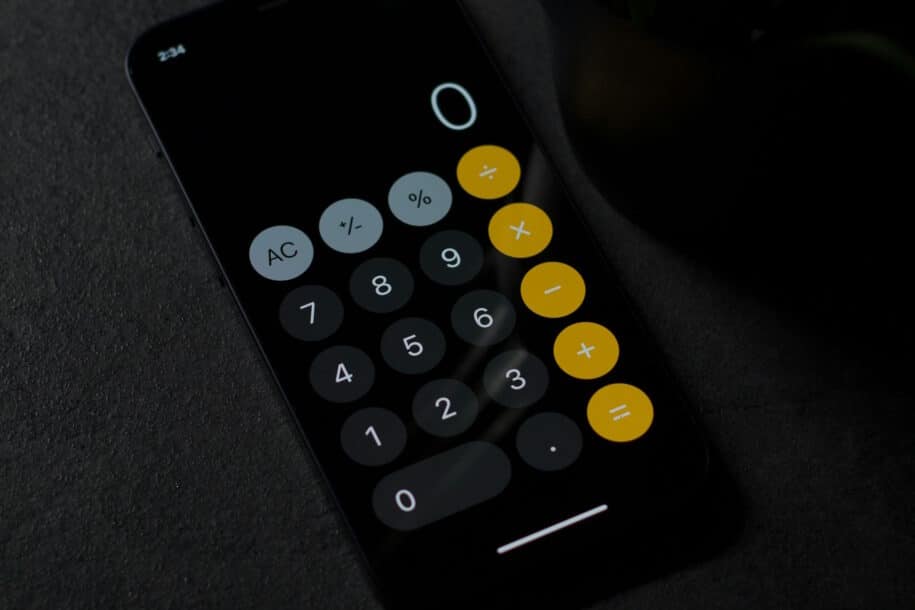Fear or distaste for math doesn’t need to prevent you from being good with money, because you don’t need that much in the way of math skills.
It’s a very common complaint I get that people say they “aren’t good with math”. Sometimes it’s more vehement than that.
“I hate math!”
“I fear numbers.”
“Math hates me.”
Now, I’ve made no secret of the fact that I love math. I minored in math in college, and I’ve long used math to what I hope are entertaining ends here on this site.
But do you need expert math skills to be good with money? Do you need to know square roots and logarithms and calculus and the like?
Absolutely not. Here’s what you do need.
Table of Contents
Addition
You do need to know how add.
One of the most effective ways of managing your money is by tracking your expenses. And if, after you get good at this, you decide to put targets in your spending categories, then you need to add up your spending.
For example, say you decide to give yourself an allowance of $300 per month in going out to eat. It’s now part way through the month, and you’ve spent $25, $30, $35, and $15 on food.
You’ve got to be able to add those numbers up. $25 + $30 + $35 + $15 = $105. That’s how much you’ve spent so far.
You don’t need to do any of this in your head though. Your phone and computer have a calculator built-in.
Subtraction
Taking the above example, when you’ve given yourself an allowance of $300 for restaurants, and you’ve spent $105 to date, when then?
You need to be able to subtract one from the other, to know how much you’ve got left.
Doing this here: $300 – $105 = $195. So you’ve got $195 to spend remaining int he month on restaurants.
Similarly, taking your whole cashflow into account, the most important equation you need to keep in mind is this:
Income = Bills + Expenses (Learn more here)
This is fundamentally the same as saying:
Income – Bills = Expenses
What this is saying is that when you take your income, and you subtract all of your bills, what’s left is what you have to spend in all of your remaining categories.
So, if you have an income of $4,000 a month, and your bills total $2,500 a month, then you have this much left for expenses.
$4,000 – $2,500 = $1,500
But again, you need only open your calculator and type in the numbers.
You don’t even need a calculator, you can Google this!

Multiplication
You also need a bit of multiplication too.
Let’s take savings goals. I’ve long said that it’s not difficult to save for big things, you only need a little bit of money over a long time. This is what makes affordable travel possible.
Say you’ve got $200 to put away in a travel savings bucket. How long would it take you to have enough money to go to Europe? Let’s say that you’ve estimated that it’s going to take you $2,400 to get there.
Well, you could take out your credit card and throw the whole $2,400 on it. But that would get you deep into debt and farther away from your goals. (It would cost you a lot in interest.)
Instead, you could wait a year. Why a year? Because:
$200 × 12 months = $2,400
So if you put away $200 a month for 12 months, you’d have enough for your trip in a year’s time.
Division
Let’s say that you’re looking to put some money away in a savings or investment account. You’re told the interest rate (the rate of return), but what does that really mean?
A useful metric is asking how long an investment would take to double. And there’s an easy way to figure that out.
You can use the “Rule of 72” to determine how long an investment will take to double. The way this works is that you take the interest rate (without the percentage), and divide 72 by that number. The resulting number is how many years the investment will take to double.
So if you have money in an account earning 8% interest, then:
72 ÷ 8 = 9 years
So no matter how much money you put it, if you leave it for 9 years, assuming the interest rate doesn’t change, it will double.
All the math you need
I’ve been doing this financial coaching work for years, and I have yet to have anyone be required to square a number, take a derivative, find the cosine of an angle, or any other more difficult math.
Addition, subtraction, multiplication, and division is all you need. And you don’t even need to be the person doing it. A simple calculator will do all the work for you.
So even if you hate math, fear not, as there is very little of it required to be good with money. The real skills are in planning, dedication, intentionality, and persistence. Nothing math-like about any of those.


